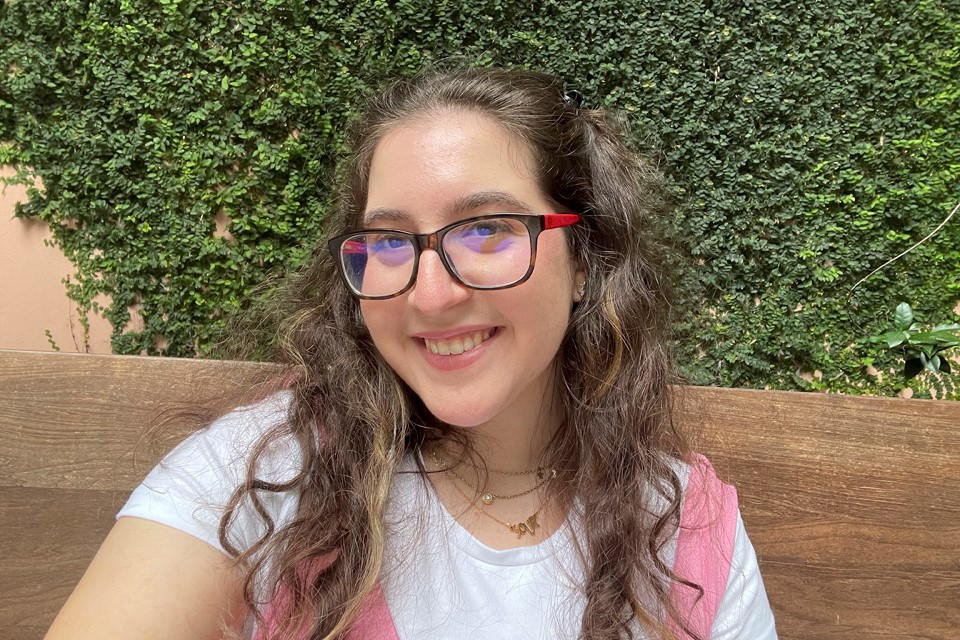How Hillel Helped Me Discover My Judaism

Dec. 15, 2021
By Emma Lichtenstein '22
I've often felt like Judaism exists in an unforgiving dichotomy: you're too Jewish or not Jewish enough.
When you're stuck in the middle, you always feel like a "bad" Jew. Rationally, I know this is not the case, but there was a time when the many ways a person can be Jewish intimidated me.
Exploring different types of Brandeis Hillel services helped me find my own way to be Jewish.
I wasn't super religious growing up, but my parents made sure that Judaism was an integral part of my life.
Officially, my family identified as Conservative Jews, but we were flexible in how we practiced. We went to Friday night Shabbat services at least once a month and celebrated all the major holidays — Rosh Hashanah, Yom Kippur, Passover — but we rarely went to Saturday Shabbat services or celebrated minor Jewish holidays.
I was one of the few religious Jewish people at my school, which made me more observant than my classmates; but, compared to my Jewish friends, I was more relaxed with how I practiced.
Brandeis University attracted me because Jewish life on campus was a huge social affair.
I was excited to meet other Jewish people when I started college. But whenever I went to Conservative services on campus, I felt out of place.
They were really different from the ones at home. The overall tone was more serious and the prayer melodies were completely foreign to me; I used to flounder during the entire service, pretending to sing along.
With little success, I went back to the same services — as opposed to any of the other three offered by Brandeis Hillel — every week, trying to adapt to these unfamiliar traditions.
When I talked to people at Shabbat dinner, I struggled to make conversation. The Jewish people I met had engaged with Judaism in more ways than I ever had. They had gone to Jewish sleepaway camp or United Synagogue Youth (USY) or BBYO [a Jewish teen movement].
I had never been interested in any of those programs. As a result, I had missed out on those meaningful experiences that young Jewish people had to help them socialize and connect with each other. Being a "good Jew" in this close-knit community felt impossible.
Ironically, at a school so full of Jewish life, most of my closest friends weren't Jewish or religious. They celebrated Christmas and Easter, but never went to church outside of those holidays.
Meanwhile, I celebrated Shabbat every week, and they kindly scheduled our Friday plans around Shabbat dinner. My friends didn't say anything, but I worried they were judging me. Did they think I was weird for going to services every week? Was I being "too good" of a Jew? I couldn't find the answers.
Then, about two months into my freshman year, my friend Rebecca suggested I come to a different Hillel Shabbat service.
She had heard me talk about feeling out of place at my services, and invited me to the smaller, more intimate service she attended.
I agreed, but the idea of new services terrified me. I had always engaged with Judaism in the same way; it had never occurred to me to try something else.
I kept forcing myself to fit into a space that was not working for me. Thankfully, Rebecca encouraged me to find a space that matched how I really wanted to practice. So, I gave it a shot.
My first time attending the new-to-me Hillel services, I felt more connected with the people there than I had in weeks at the other services.
Emboldened by my success, I tried all the services Brandeis Hillel offered. In each of them, I found something of value for my own practice. I didn't have to feel stuck; I could create a version of ritual that felt right for me.
Since my first year, I've continued to mix and match services to create a practice that fits my needs. I no longer cling to a certain way of practicing Judaism as a marker of being a "good" Jew. I don't go to Shabbat every week, or even every month. When I go, it's for a spiritual connection that makes me feel happy.
After struggling to find my place, I've come to see that there's no such thing as too Jewish or not Jewish enough. All it takes to be a good Jew is to believe that you are one.
This article originally appeared on the Hillel International website and is reprinted with permission.